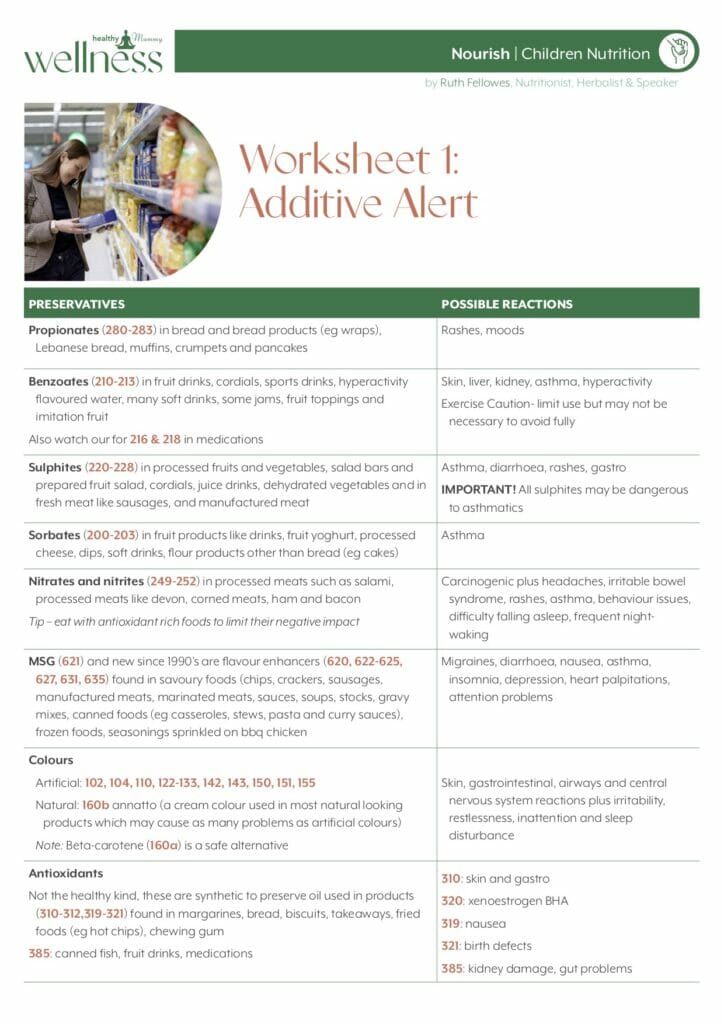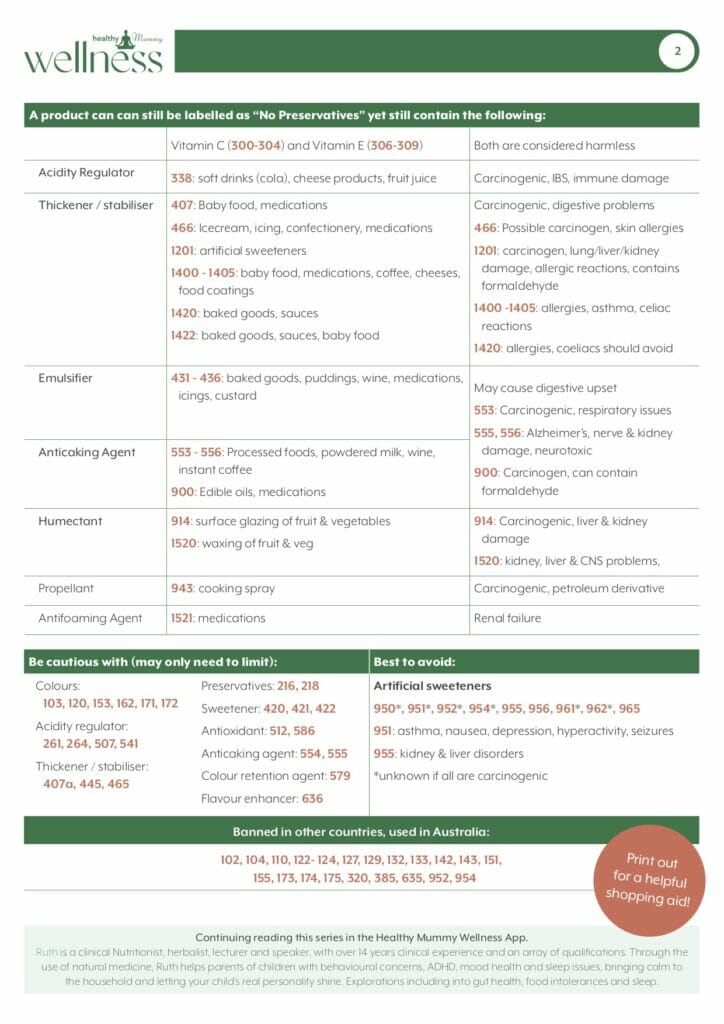![]()
How food affects a child’s behaviour and mood

It’s been well documented that there is a very real link between diet and the potential lack in nutrients that can lead to behavioural issues.
Ruth Fellows is a Clinical Nutritionist, Herbalist Educator and sheds more light on the topic in a recent podcast from the Healthy Mummy Wellness App.
Ruth helps parents of children with behavioural concerns, ADHD, mood health and sleep using natural medicine, to bring calm to the household and to let your child’s real personality shine.
Her professional qualifications include a Masters Degree in Public Health, a Health Science degree in Complementary Medicine, and advanced diplomas in Nutritional Medicine and Western Herbal Medicine.
So what is happening with our children when it comes to behaviour and nutrition?

The problem we have in Australia, Ruth explains, is like many western cultures, we have an abundance of food available to us in general.
Yet it’s not recognised widely that children are not getting enough nutrient rich foods that have powerful impacts on their physical growth, emotional growth and brain development and maturity.
We are what we eat
There is a knock on effect to learning capacity, behaviour, mood and sleep The bottom line is that we are what we eat. And we don’t simply eat well to be “healthy” but for a whole range of reasons.
The nutrients we consume are a mix of chemicals that interact and work with our own unique individual chemical structure.
Nutrients will either enhance and achieve good results – improving and speeding up pathways and build and maintain connections.
Keeping every ticking along nicely – or a lack of nutrients for a particular child can result in a slowing down or jamming up in our system and missing connections so that things don’t flow as efficiently.
Four important nutrients for children

As mentioned – nutrition isn’t simply about body health. The brain is a huge user of nutrients, and it’s fuel can only come from what we eat.
The resources and tools we give the brain are therefore critically important. There are certain nutrients that it heavily favours or prefers, and there are a top 4 that we need to look out for.
Iron
Our first one is Iron deficiency. Most of the time you may think as a parent that your child is iron deficient because they are tired and generally you may be right.
But iron deficiency doesn’t just cause fatigue. You could have a child full of energy that has iron deficiency so you can’t be fooled by that one common flag.

Iron doesn’t just control energy it also controls appetite. So decreased appetite can also be a side effect of iron deficiency.
A child that doesn’t pay attention or can’t focus at school is also a sign of iron deficiency. Iron is needed to build a neural transmitter in the brain called dopamine.
Many families will recognise this as many medications for ADHD are trying to boost dopamine levels in the brain.
Naturally we can increase attention and focus by making sure there is enough dopamine in the child’s body and brain in order to function appropriately.
Iron will also impact on sleep. And we are so used to associating iron with energy it seems at odds with how we have been programmed to think about iron but a child’s sleeping does correlate with iron deficiency.
When a body has enough iron a lot of these issues resolve as it can achieve its every day functions. And it is good for them to be sitting at a good healthy level and not just borderline, it’s important that they have plenty of reserve and not running on empty.
A simple prescribed supplement can make a world of difference. Your child may eat plenty of meat but simply not able to digest the meat quickly or efficiently enough to draw out the iron affectively so you may also need to look at gut health and digestive issues.
Sometimes children just need more as they are in a particular growing stage so it’s something we always need to be watching out for. In this sense a good iron supply will help with what’s known as “growing pains” in children.
And the preference is to avoid having calcium when having iron (ie: avoid a glass of milk with dinner) as this affects absorption, especially if you have a sluggish digestive system.
Zinc

Now a hot contender for first place with iron in terms of deficiencies is zinc. This is seen more and more in younger children from the get go and not necessarily related to dietary intake.
Our health when pregnant can in fact have a longer term flow on effect to the health of our children but we can only work with what we know and then take the steps needed to provide the correction and balance.
Zinc is a trace mineral, meaning that the body only needs small amounts, and yet it is necessary for almost 100 enzymes to carry out vital chemical reactions.
It is a major player in the creation of DNA, growth of cells, building proteins, healing damaged tissue, and supporting a healthy immune system.
So a lack of Zinc will have similar effect to a lack of Iron – appetite, digestion and how it functions and extracts the iron, impacts on sleep and mood.
This may mean you have a child that has big highs and big lows, or is constantly angry or aggressive, or an anxious or oversensitive and worried child.
How they express an overwhelm or overstimulation that comes from the senses. And always remember your child is an individual so it’s good to not get fixated on standard recommendations.
If you have a hunch that your child is deficient or lacking in particular nutrients you are more than likely right. We all metabolise differently, we have different blocks in place that impact what we do with our nutrients.
B6 & Magnesium

Magnesium plays many crucial roles in the body, such as supporting muscle and nerve function and energy production. It is also involved with the activity of bone-building cells and the parathyroid hormone, which regulates calcium levels.
Zinc and B6 go hand in hand and in the brain they are like best friends. They regularly work together as a team, making sure they get that beautiful balance of the neural transmitters, making sure you have your attention or focal transmitters in place when they need to be.
They also boost up the calming and the soothing transmitters so you have that balance between being revved up for attention and focus being brought back down when its appropriate and not over stimulated.
Despite there being evidence and research showing this link between nutrient deficiencies and behaviours, the conversation just doesn’t seem to be happening and isn’t common knowledge. As always awareness is so important.
What about supplements?

And you may question whether food intake is enough or whether supplements are necessary. And this would all depend on how bad the side affects are.
But often the recommendation would be for supplements as this is the quickest and most affective way to get a good volume into the body so you can start to see some positive results.
And in the meantime you can chip away at looking at better ways to get the nutrients naturally into your regular diet. So that you have the tools in place for when you drop the supplements.
The signs to look out for

There are some neat tricks in terms of body signs – which simply means what is happening physically on the skin, the nails, the tongue or around the eyes as give away clues.
A quick tip or neat easy trick for iron in children is if you pull down the lower eyelid and look inside what you should see is a big pop of red. If your first impression is that it looks a bit peachy or pinky or coral in colour go and see someone to get those iron levels looked at.
Combined with a correlation you may note with sleep and mood or attention and behaviour.
Don’t buy the gummies!
This could just be a way of knowing you need to start a conversation as to whether you need to supplement, what dosing and for how long etc.
A workaround could be to use a multivitamin but it is a challenge finding a good children’s multivitamin.
A hot tip is save your money and don’t buy the gummies! They are often full of rubbish and more of a glorified lolly. They won’t achieve any nutritional correction. You also don’t want to create new imbalances over the long run unintentionally by relying on supplements so it’s always best to get professional advice.
You don’t want to under dose and everything on the market for children in terms of iron is deliberately low in dosage so you don’t unintentionally overdo it.
The downside is you may trial and see no affects because your child in fact needs more than what is suggested, because they are in a deficient state and that can be disappointing or discouraging. It’s all about timing, dosage and duration to enhance the affect of the supplementation.
So with all these nutrients you are looking at a pattern. Whether you are looking at them singularly or all 4 – they will have an effect on behaviour, on sleep, mood and appetite.
So if these are sweeping areas that you can notice in your child you need to have a conversation about nutrient deficiencies because these are your clues or red flags as a parent. And certainly something we all need to take note of or be aware of.
Something so simple and yet so overlooked in many cases. And luckily quite easily rectified!


TOP 3 TAKEAWAY TIPS
- Check for red flags in terms of mood, behaviour, sleep and appetite
- Check what is happening physically for indicators of iron deficiency
- If you have a hunch run with it and seek professional advice
Get Access to the full Podcast in the Healthy Mummy Wellness App

The Healthy Mummy Wellness app is built to support mums’ mental, physical and social wellbeing. We have expert advice to help mums makeover their minds, transform their mood, manage their hormones, sleep better and engage with their family. You can listen to podcasts, read blogs, work out with our trainers and find healthy, family-friendly recipes from the palm of your hand.
Get the Healthy Mummy Wellness App here



